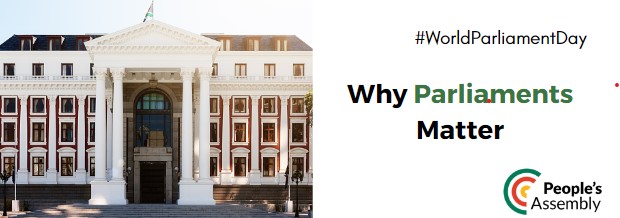On the 30th of June, the world comes together to celebrate International Day of Parliamentarism, also referred to as World Parliament Day; recognising the crucial role of parliaments in promoting democracy, upholding human rights, and facilitating inclusive governance. The focus for this year is climate action. The Inter-Parliamentary Union (IPU) has launched a campaign, “Parliaments for the Planet” which is designed to mobilise parliaments and parliamentarians to act on the climate emergency.
In a 2022 review, we examined the actions and effectiveness of the South African Parliament in achieving outcomes in relation to the climate change agenda. We also highlighted the observations, comments and recommendations of key stakeholders. You can access the full review on the PMG website: READ HERE
All over the world, parliaments exist to represent the people to ensure government by the people– this is said to be the most profoundly important role parliament plays as an institution. Parliament represents the people by articulating the views of citizens in decision-making processes. Parliament is the bedrock of representational democracies or the sine qua non of representative democracy. It thus plays a unique and pivotal role that no other institution in a representative democracy can replace.
Parliament, in South Africa, ensures government by the people through its primary functions:
- Debate the important issues of the day
- Facilitate public participation
- Scrutinise, oversee and hold the government accountable
- Pass the budget and oversee government spending
- Initiate, process, amend and repeal legislation
- Recommend statutory appointments
- Ratify International Instruments
Additionally, the work of Parliament is centred around transparency and openness – this gives the public insight into governance and critical decision-making.
Parliamentary Committees are an important venue for parliamentary activities. They are the site where most of Parliament’s business is organised. Committees have more time to study, interrogate and debate proposed legislation, policy proposals and budget plans, and to conduct oversight. There is a parliamentary committee responsible for overseeing each government department. They also provide a platform for the public to engage with Members of Parliament (MPs) directly. Notably, stakeholder/interest groups and members of the public can influence Committee programmes but this is seldom done. Citizens have a right to proactively lobby for their concerns to be included in the programme and to highlight what issues should be prioritised. Further, they can provide parliamentary committees with on-the-ground feedback and expert information. Learn more
Like with many democracies in the world, the public trust in the national legislature is low. According to a 2021 Afrobarometer survey, “fewer than two in five South Africans trust the president “somewhat” or “a lot,” and more than two-thirds have “just a little” or “no trust at all” in Parliament, the police, and their local council. Public trust in elected representatives is particularly low, and only a quarter of South Africans express trust in either the ruling or opposition parties”.
The findings in the Zondo Commission about weak parliamentary oversight has further diminished the public’s perception and trust in the legislature.
South Africa’s Parliament needs strengthening. It’s limitations include: weak oversight and accountability; poor public participation, and stakeholder management; poor co-ordination of effort with key partners; lack of implementation of previous recommendations; public trust diminishing; lack of technical tools to support oversight; ineffective support for constituency work; fragmented governance and ineffective decision-making; lack of clarity of powers, functions, decision-making and limitations of structures; uneven resource allocation; weak strategy execution and poor outcomes for the institution,
The International Day of Parliamentarism provides an occasion to celebrate the achievements and also reflect on what reforms are needed to reinvigorate this important institution.


Comments
Keep comments free of racism, sexism, homophobia and abusive language. People's Assembly reserves the right to delete and edit comments
(For newest comments first please choose 'Newest' from the 'Sort by' dropdown below.)